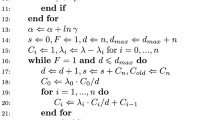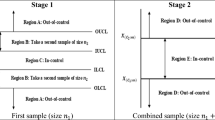Abstract
This paper considers two Markovian arrival single server queueing models, namely M/M/1 and \(M/E_r/1\). Under the steady state condition, we observe the number of customer present at different time points for the M/M/1 queue while in case of an \(M/E_r/1\) queue we consider the number of arrivals during the service time of a customer. A Bayesian approach is applied to study the change point problems. Testing of hypothesis for change versus no-change is carried out using predictive distributions. Further, Bayes factors are derived for change versus no-change for both the M/M/1 and \(M/E_r/1\) queueing models under natural conjugate beta prior distribution. At last, numerical results are provided for the illustration.
Similar content being viewed by others
References
Abramowitz M, Stegun IA (1964) Handbook of Mathematical Functions. Dover Publication, New York
Acharya SK, Villarreal CE (2013) Change point estimation of service rate in \(M/M/1\) queue. Int J Math Oper Res 5(1):110–120
Acharya SK, Singh SK, Villarreal-Rodríguez CE (2020) Asymptotic study on change point problem for waiting time data in a single server queue. Int J Manag Sci Eng Manag 15:39–46
Almeida MAC, Cruz FRB (2018) A note on Bayesian estimation of traffic intensity in single server Markovian queues. Commun Stat Simul Comput 47(9):2577–2586
Barry D, Hartigan JA (1993) A Bayesian analysis for change point problems. J Am Stat Assoc 88(421):309–319
Basak A, Choudhury A (2019) Bayesian inference and prediction in single server \(M/M/1\) queuing model based on queue length. Commun Stat Simul Comput. https://doi.org/10.1080/03610918.2019.1586924
Braham H, Berdjoudj L, Boualem M, Rahmania N (2019) Analysis of non-Markovian queueing model: Bayesian statistics and MCMC methods. Monte Carlo Methods Appl 25(2):147–154
Broemeling LD (1972) Bayesian procedure for detecting a change in a sequence of random variables. Metron 30:214–227
Carlin BP, Gelfand AE, Smith AFM (1992) Hierarchical Bayesian analysis of change point problems. Appl Stat 41(2):389–405
Chernoff H, Zacks S (1964) Estimating the current mean of a normal distribution which is subject to change in time. Ann Math Stat 35(3):999–1018
Chen J, Gupta AK (2000) Parametric Statistical change point analysis. Birkhäuser, Berlin
Chowdhury S, Mukherjee S (2013) Estimation of traffic intensity based on queue length in a single \(M/M/1\) queue. Commun Stat Theor Methods 42(13):2376–2390
Chowdhury S, Maiti SS (2014) Bayes estimation of traffic intensity in an \(M/E_r/1\) queueing model. Res Rev J Stat 1:99–106
Clarke AB (1957) Maximum likelihood estimates in a simple queue. Ann Math Stat 28(4):1036–1040
Dey DK, Purkayastha S (1997) Bayesian approach to change point problems. Commun Stat Theor Methods 26(8):2035–2047
Guttman I, Menzefriche U (1982) On the use of loss-functions in the change point problem. Ann Inst Stat Math 34:319–326
Gross D, Harris CM (1998) Fundamentals of queueing theory, 3rd edn. Wily, New York
Hinkley DV (1970) Inference about the change-point in a sequence of random variables. Biometrika 57:1–17
Jain S (1995) Estimating changes in traffic intensity for \(M/M/1\) queueing systems. Microelectron Reliab 35(11):1395–1400
Jain S (2001) Estimating the change point of Erlang interarrival time distribution. INFOR Inf Syst Oper Res 39(2):200–207
Jeffreys H (1961) Theory of Probability, 3rd edn. Oxford University Press
Kass RE, Raftery AE (1995) Bayes factors. J Am Stat Assoc 90:773–795
Lee CB (1998) Bayesian analysis of a change point in exponential families with application. Comput Stat Data Anal 27:195–208
McGrath MF, Gross D, Singpurwalla ND (1987) A subjective Bayesian approach to the theory of queues I-modeling. Queueing Syst 1(4):317–333
McGrath MF, Singpurwalla ND (1987) A subjective Bayesian approach to the theory of queues II-inference and information in \(M/M/1\) queues. Queueing Syst 1(4):335–353
Muddapur M (1972) Bayesian estimates of parameters in some queueing models. Ann Inst Stat Math 24(1):327–331
Page ES (1954) Continuous inspection schemes. Biometrika 41(1–2):100–115
Pettit LI (1990) The conditional predictive ordinate for the normal distribution. J Roy Stat Soc B 52:174–184
Pettit LI, Young KDS (1990) Measuring the effect of observations on Bayes factors. Biometrika 77:455–466
Raftery AE, Akman VE (1986) Bayesian analysis of a Poisson process with a change-point. Biometrika 73:85–89
Singh SK, Acharya SK (2019) Equivalence between Bayes and the maximum likelihood estimator in \(M/M/1\) queue. Commun Stat Theor Methods 48(19):4780–4793
Singh SK, Acharya SK (2019) Bayesian change-point problem for traffic intensity in \(M/E_r/1\) queueing model. Jpn J Stat Data Sci 2(1):49–70
Singh SK, Acharya SK (2021) Bernstein-von Mises theorem and Bayes estimation from single server queues. Commun Stat Theor Methods 50(2):286–296
Singh SK, Acharya SK (2021) On the rate of convergence in the Bernstein-von Mises Theorem for \(M/M/1\) queue. J Indian Soc Probab Stat 22:181–200
Singh SK, Acharya SK (2022) A Bayesian inference to estimate change point for traffic intensity in \(M/M/1\) queueing model. Opsearch 59:166–206
Singh SK, Acharya SK, Cruz FRB, Quinino RC (2021) Bayesian sample size determination in a single-server deterministic queueing system. Math Comput Simul 187:17–29
Singh SK, Acharya SK, Cruz FRB, Quinino RC (2021) Estimation of traffic intensity from queue length data in a deterministic single server queueing system. J Comput Appl Math 398:113693
Singh SK, Acharya SK, Cruz FRB, Quinino RC (2022) Bayesian inference and prediction in an \(M/D/1\) queueing system. Commun Stat Theor Methods. https://doi.org/10.1080/03610926.2022.2076120
Smith AFM (1975) A Bayesian approach to inference about a change-point in a sequence of random variables. Biometrika 62:407–416
Acknowledgements
The author is thankful to the three referees for their detailed comments and suggestions, which led to a much improved manuscript.
Funding
The author has not received any funding for this research.
Author information
Authors and Affiliations
Corresponding author
Ethics declarations
Conflict of interest
The author declares that he has no conflicts of interest.
Additional information
Publisher's Note
Springer Nature remains neutral with regard to jurisdictional claims in published maps and institutional affiliations.
Rights and permissions
Springer Nature or its licensor holds exclusive rights to this article under a publishing agreement with the author(s) or other rightsholder(s); author self-archiving of the accepted manuscript version of this article is solely governed by the terms of such publishing agreement and applicable law.
About this article
Cite this article
Singh, S.K. Change point problem for Markovian arrival queueing models: Bayes factor approach. Int J Syst Assur Eng Manag 13, 2847–2854 (2022). https://doi.org/10.1007/s13198-022-01750-x
Received:
Revised:
Accepted:
Published:
Issue Date:
DOI: https://doi.org/10.1007/s13198-022-01750-x




